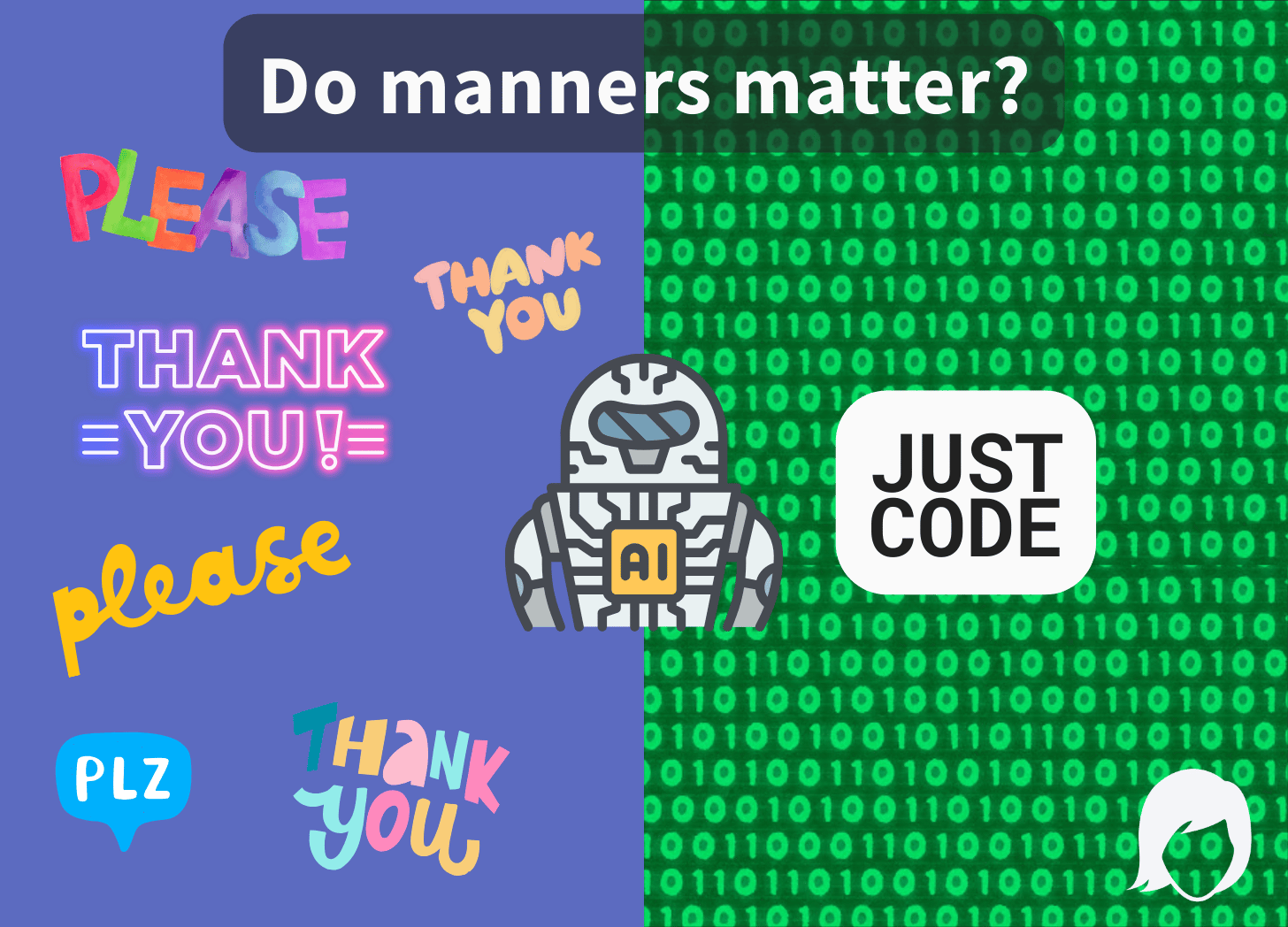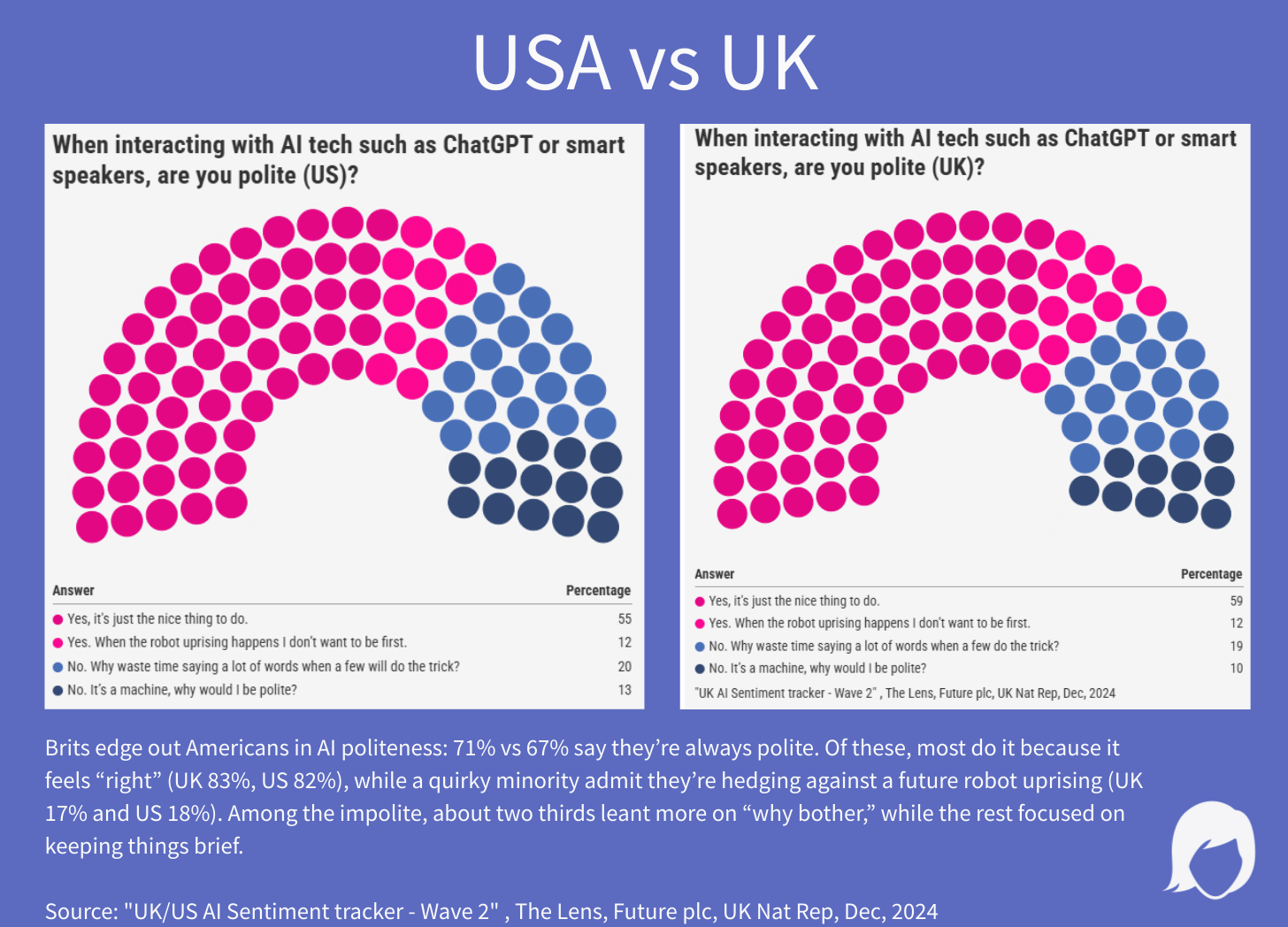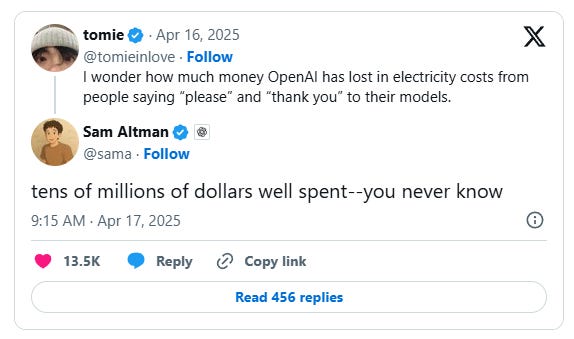Should you be polite to ChatGPT? The hidden costs and culture of digital manners
Exploring the psychology, culture, and real-world costs of being polite to AI
One evening, I was sitting around with friends when the conversation unexpectedly turned to politeness with AI. Should we say “please” and “thank you” to ChatGPT? Some thought manners always matter, no matter who, or what, is on the receiving end. Others argued it was pointless and even wasteful, adding unnecessary words that only strain the environment. We couldn’t agree, so I decided to dig a little deeper.
At first glance, asking whether to be polite to ChatGPT or other AI chatbots might seem trivial. Why bother? After all, there’s no human heart listening. Yet this simple question has sparked heated debates, prompted high-level commentary, and even racked up real financial and ecological costs in the world of large language models.
Let’s unpack why AI etiquette matters - to us, to the machines, and to the future of digital interaction.
The surprising prevalence of AI politeness
When ChatGPT burst into offices, classrooms, and living rooms, users brought more than questions, their manners came along too. According to a recent Future study, nearly 80%1 of users in the UK and USA report habitually saying “please” and “thank you” to AI platforms. In the United States, the same survey found 67% of Americans regularly use polite language when talking to chatbots or digital assistants.
The phenomenon isn’t limited to English-speaking nations or specific age groups: across Europe and Asia2, users young and old report using polite prompts out of habit or hope, sometimes half-jokingly, as insurance against a future where robots remember who was nice and who wasn’t.
Why are we so nice to the machines?
Surveys and behavioral studies suggest several explanations for why digital politeness is so common:
Human habit: For roughly 55% of respondents, being polite to AI simply “feels like the right thing to do”, a reflex engrained from decades of social learning3.
Sci-fi fear: Around 12% admit they’re “hedging their bets”, fueled by science fiction tropes about sentient AI keeping score for some not-so-distant reckoning4.
Efficiency vs. empathy: About 20% consciously avoid extra words to keep interactions efficient, while a further 13% reject politeness outright because “it’s just code”.5
Psychologically, this boils down to anthropomorphism (our tendency to assign human traits to non-humans), social norms, and habits learned in childhood, all spilling over into our digital lives. Even when we know ChatGPT isn’t sentient, old habits die hard.
Does politeness actually improve AI output?
Here’s where things get interesting: does kindness in our prompts actually make the machine “nicer” or more helpful in return?
Prompt engineering evidence: Many educators and prompt engineers report that polite language (“Can you please explain…” vs. “Explain…”) sometimes yields more complete and professional responses.6 This likely reflects how LLMs are trained, absorbing patterns and cues from datasets that reward courteous interaction.
Crowdsourced observations: Reddit and forum threads are full of anecdotal experiments: some users swear that asking nicely gets better answers, especially for complex or creative tasks.
Skepticism remains: Formal tests don’t show consistent gains. The model doesn’t “feel” gratitude; it simply processes more context. Adding “please” won’t universally unlock superior output, and over-verbosity can even confuse technical queries.7
So, while the nicest phrasing won’t guarantee better results, being clear, respectful, and specific almost always does. In that sense, AI etiquette can help the human writer as much as the machine.
The hidden price tag of politeness
When billions of people interact daily with ChatGPT, a few extra tokens per query adds up fast. OpenAI CEO Sam Altman, in a tongue-in-cheek but sincere tweet, estimated that all those digital pleasantries cost the company “tens of millions of dollars” annually in energy and computing expenses.8
Each “please” or “thank you” may seem trivial, but multiplied across billions of prompts:
More polite (and thus longer) prompts require more computation.
Extra processing increases server energy use, translating to financial and ecological costs.
Altman called it a worthwhile investment: “Tens of millions of dollars well spent - you never know.” It’s a playful nod to the idea that, whether or not the machines care, society might be better off if people keep their habits of kindness.
Politeness as a mirror of humanity
AI experts argue that how people interact with chatbots reflects more than prompt style. It reveals what kind of culture we want as AI becomes ubiquitous.
Reinforcing positive habits: Amazon Alexa’s Magic Word9 feature encouraged kids to use “please” and “thank you,” sparking debate over whether politeness to machines helps children develop respectful communication.
Professionalism and tone: In business or customer service, polite phrasing sets a tone of civility, regardless of whether a human or machine is on the other end10.
Rudeness rehearsal debate: Some ethicists warn that barking commands at AI could desensitize us to rudeness in human relationships. The cautionary tale of Microsoft’s Tay, an AI that learned toxic behavior from user prompts, shows how human interactions really can shape machine culture11.
Blurring boundaries: Google’s Duplex demo in 201812, where the AI sounded so human that it was hard to know whether to say “please,” highlighted how politeness norms blur when digital assistants become conversationally lifelike.
And yet, there’s a pragmatic counterpoint: efficiency matters. Many prompt professionals recommend being concise for technical queries, where clarity beats courtesy.
Key takeaway: Politeness to ChatGPT isn’t about the machine, it’s about us. Saying “please” and “thank you” won’t change how the AI feels, but it can shape your mindset, reinforce respectful habits, and even set the tone in professional settings. Just keep in mind that extra words scale up to real costs, so use courtesy where it adds value, and brevity where clarity matters most.
So, should you be polite to ChatGPT?
Here’s the bottom line as far as I’m concerned:
If politeness comes naturally, keep it up. It helps reinforce positive habits for future digital and human interactions, and the personal cost is negligible.
For technical or large-scale automation, concise requests save time, reduce complexity, and minimise unnecessary computation. No need to force social conventions where clarity is key.
Saying “please” and “thank you” to ChatGPT won’t unlock secret features or make it happier, but it might gently shape your own mindset.
In a world racing toward ever more intimate AI partnerships, that could be the most valuable outcome of all.
Every interaction, even with code, is a mirror of humanity’s evolving culture. If kindness becomes a habit, digital or not, I think that’s a cost worth paying.
Future via TechRadar. (Hector, Hamish). Are you polite to ChatGPT? Here’s where you rank among AI chatbot users, 20 February 2025.
Yin, Z., Wang, H., Horio, K., Kawahara, D., & Sekine, S. (2024). Should We Respect LLMs? A Cross-Lingual Study on the Influence of Prompt Politeness on LLM Performance. ArXiv, DOI:10.48550/arXiv.2402.14531.
The Decision Lab. (Wasco, Gabrielle). Why are we polite to ChatGPT? 20 January 2025.
(Green, Jonathon). Your ChatGPT manners are costing millions (and maybe the planet), 3 May 2025.
Diplo. (Kurbalija, Jovan). Politeness in 2025: Why are we so kind to AI? 23 April 2025.
Forbes. (Eliot, Lance). Hard Evidence That Please And Thank You In Prompt Engineering Counts When Using Generative AI, 18 May, 2024.
Information Age. (Chugh, Ritesh). Why you shouldn’t say ‘please’ to ChatGPT, 21 May 2025.
SurfTech IT. Tech News : Why Being Polite To ChatGPT Is Costing Millions, 30 April 2025.
BBC. Amazon Alexa to reward kids who say: ‘Please’, 26 April 2018.
Diplo. (Kurbalija, Jovan). Politeness in 2025: Why are we so kind to AI? 23 April 2025.
ABC News. TayTweets: Microsoft apologises for offensive tirade by its AI 'chatbot', 26 March 2016.
Google Research. (Leviathan, Yaniv; Matias, Yossi). Google Duplex: An AI System for Accomplishing Real-World Tasks Over the Phone, 8 May 2018.





